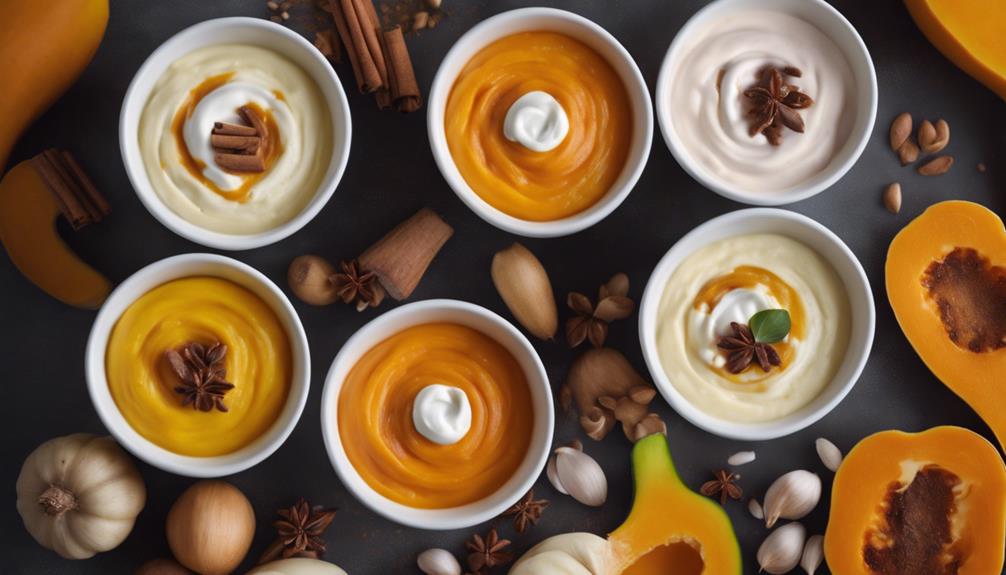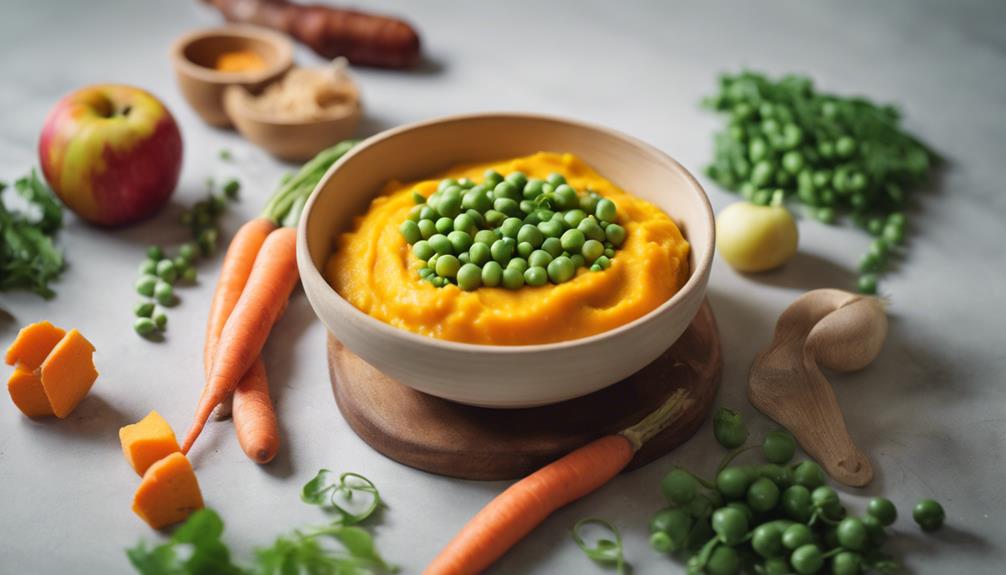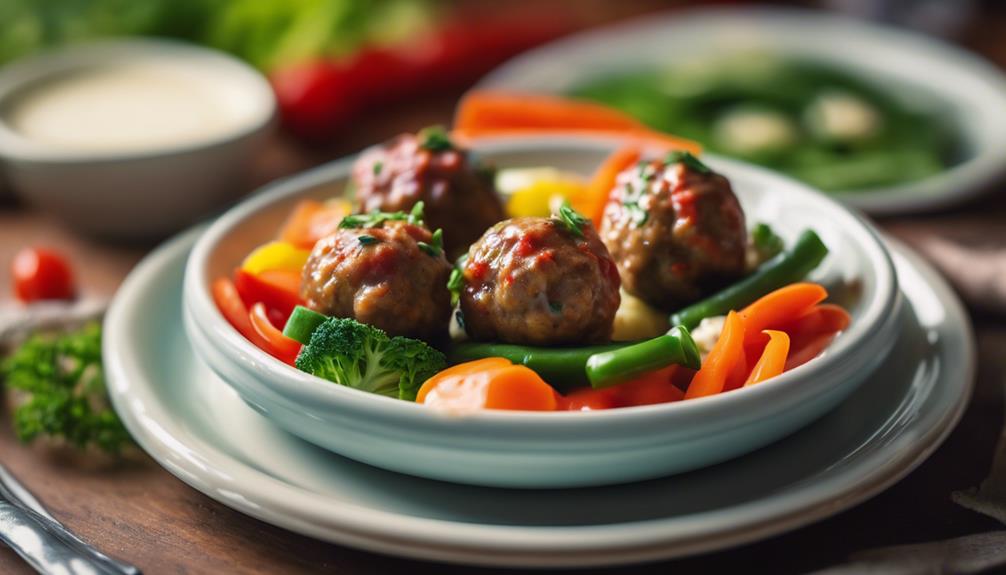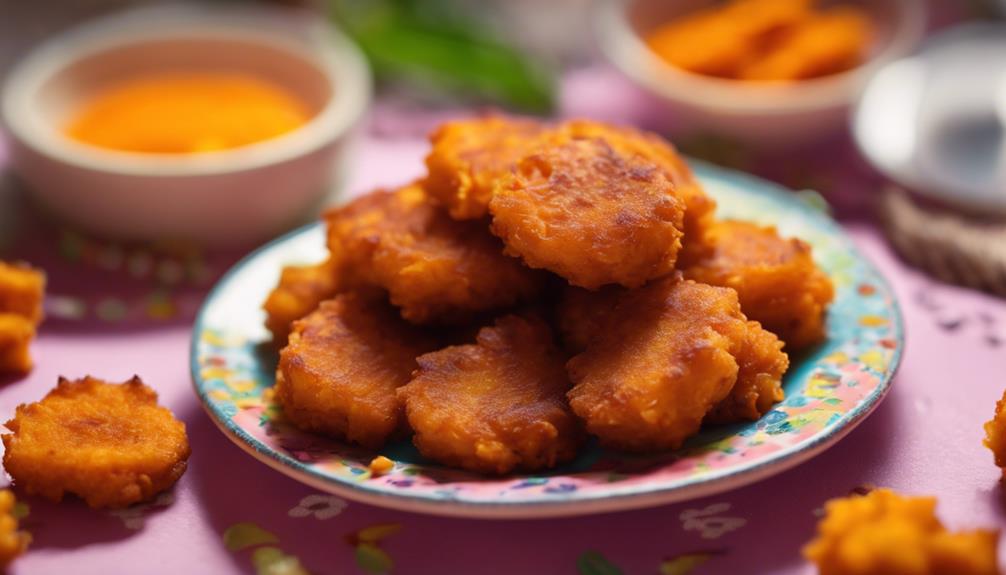Access the world of nutritious flavors by mixing butternut squash puree with fruits like apples, carrots, and sweet potatoes. This fusion offers essential vitamins and minerals important for your baby's well-being. Tantalize their taste buds with sweet and savory recipes enriched with necessary nutrients. Try diverse ingredients and spices for a culinary adventure. Balance their meals by incorporating protein sources such as chicken. Enhance their growth and development with each delightful bite. Your baby deserves a wholesome start—explore the endless possibilities of butternut squash baby puree combinations.
Key Takeaways
- Combine butternut squash with apples for a sweet twist.
- Pair butternut squash with carrots for a colorful and nutritious puree.
- Mix butternut squash with sweet potatoes for added flavor and nutrients.
- Experiment with cinnamon or nutmeg for a delicious and aromatic touch.
- Consider adding a hint of ginger for a unique and flavorful puree.
Nutritional Benefits of Butternut Squash
Butternut squash provides a wide array of essential nutrients that are beneficial for both you and your baby's health. This sweet and versatile vegetable is packed with vitamins such as A, C, and E, along with minerals like potassium and magnesium. These nutrients play a vital role in supporting your baby's growth and development.
Vitamin A, found abundantly in butternut squash, is crucial for vision, immune function, and skin health. The antioxidants present, like beta-carotene, help protect against chronic diseases and boost the immune system, ensuring your baby stays healthy.
Additionally, the fiber content in butternut squash promotes healthy digestion and aids in weight management, making it a nutritious choice for both babies and adults.
You can easily incorporate this nutrient-rich vegetable into your baby's diet by preparing homemade butternut squash puree, which can be cooked and used in various sweet and savory recipes tailored to your baby's taste preferences. Enjoy the health benefits of butternut squash for your little one today.
Feeding Butternut Squash to Babies

To introduce butternut squash to your baby, consider serving it as a puree or cutting it into soft finger foods. Butternut squash for babies is a nutritious choice packed with essential vitamins and minerals. It can be easily incorporated into homemade baby food combinations, providing a tasty and healthy option for your little one. When cooking butternut squash, roasting is a great method as it results in a soft and creamy texture that is ideal for babies to eat.
Here is a guide on feeding butternut squash to babies:
| Cooking Method | Preparation | Serving Suggestion |
|---|---|---|
| Roasted | Peel, deseed, chop | Soft finger foods |
| Steamed | Cubed, steam | Pureed with other foods |
| Boiled | Sliced, boil till soft | Mixed into baby cereals |
Remember to store butternut squash puree in airtight containers in the refrigerator for up to three days or freeze for future use. Start by offering small amounts to see how your baby reacts to this nutritious food option.
Butternut Squash Baby Food Combinations

Consider mixing butternut squash with various fruits and veggies like apples, pears, bananas, carrots, peas, and sweet potatoes to create sweet and savory recipes for baby food purees. These food combinations not only offer a delicious taste but also provide a wide range of vitamins and minerals essential for your baby's growth and development. Butternut squash, a type of winter squash, is known for being rich in nutrients, making it a great choice for homemade baby food.
When preparing butternut squash baby food combinations, don't hesitate to experiment with different ingredients to find what your little one enjoys the most. You can also add spices like cinnamon to enhance the flavors of these purees.
For a more balanced meal, consider adding protein sources such as chicken or lamb to the mix. By combining these elements, you can create a variety of nutritious and flavorful options to introduce to your baby's diet.
Making Butternut Squash Puree for Babies

For preparing butternut squash puree for your baby, start by baking or steaming the squash until tender. Once the cooked butternut squash has cooled, peel off the skin and remove the seeds. Cut the squash into small chunks and place them in a blender or food processor. If desired, you can add a cooked sweet potato for added flavor and nutrients. Blend the ingredients until smooth, adding water gradually to reach your preferred consistency for the homemade butternut squash baby puree.
Homemade butternut squash baby food is versatile and nutrient-rich, providing essential vitamins and minerals for your baby's growth and development.
Remember to store any leftover puree in the fridge for up to three days or freeze it for future use. When feeding your baby, adjust the puree's thickness by mixing in water, formula, or breast milk to suit your baby's preferences.
Making your own butternut squash puree is a simple and healthy way to introduce nutritious food to your little one.
General Baby Feeding Tips

Start offering a variety of textures and flavors during weaning to introduce diverse tastes to your baby. This exposure to different baby food recipes helps develop their palate.
Encouraging self-feeding with appropriate finger foods not only enhances their motor skills but also fosters independence during mealtime. Remember to introduce new foods gradually to monitor for any allergies that may arise.
It's pivotal to avoid adding salt, sugar, or honey to your baby's meals to maintain their developing taste preferences and overall health.
Creating a positive mealtime environment is essential for your baby's relationship with food. Consult with your pediatrician for guidance on best practices for weaning and introducing solids.
Frequently Asked Questions
Can Babies Eat Butternut Squash Every Day?
Yes, babies can eat butternut squash every day, but it's wise to introduce new foods gradually to monitor reactions. Butternut squash offers essential nutrients like vitamin A and fiber, supporting your baby's growth and development.
Is Butternut Squash a Stage 1 Baby Food?
Yes, butternut squash is a stage 1 baby food. It's smooth, easy to digest, and packed with essential nutrients like vitamins A and C, perfect for introducing solids to your little one around 4-6 months.
What Is the Best Squash to Feed Baby?
When feeding your baby, opt for butternut squash. Its sweet taste and gentle texture make it an ideal choice. Packed with essential nutrients, it's easy to digest and widely available. Your baby will love it!
Can You Mix Baby Foods Together?
You can definitely mix baby foods together to introduce new flavors and nutrients. Get creative and combine different purees to broaden your baby's palate. Just remember to be cautious about potential allergies when trying out new combinations.
Conclusion
To sum up, butternut squash baby puree combinations offer a delicious and nutritious option for your little one's diet.
The versatility of butternut squash allows for endless possibilities in creating flavorful and healthy meals.
By incorporating this superfood into your baby's diet, you're providing essential vitamins, minerals, and antioxidants to support their growth and development.
So, get creative in the kitchen and explore the endless options of butternut squash puree combinations for your baby's next mealtime adventure.









